Key takeaways:
- Financial literacy courses provide essential skills in budgeting, saving, and investing, empowering individuals to manage their finances effectively.
- Understanding financial concepts, such as compound interest and the difference between needs and wants, can lead to informed spending choices and long-term wealth building.
- Finance mobile apps enhance financial management by providing real-time insights and gamifying budgeting tasks, making the process more engaging and less daunting.
- Visualization tools and goal-setting features in finance apps help users track expenses and savings progress, promoting a sense of empowerment and control over their finances.
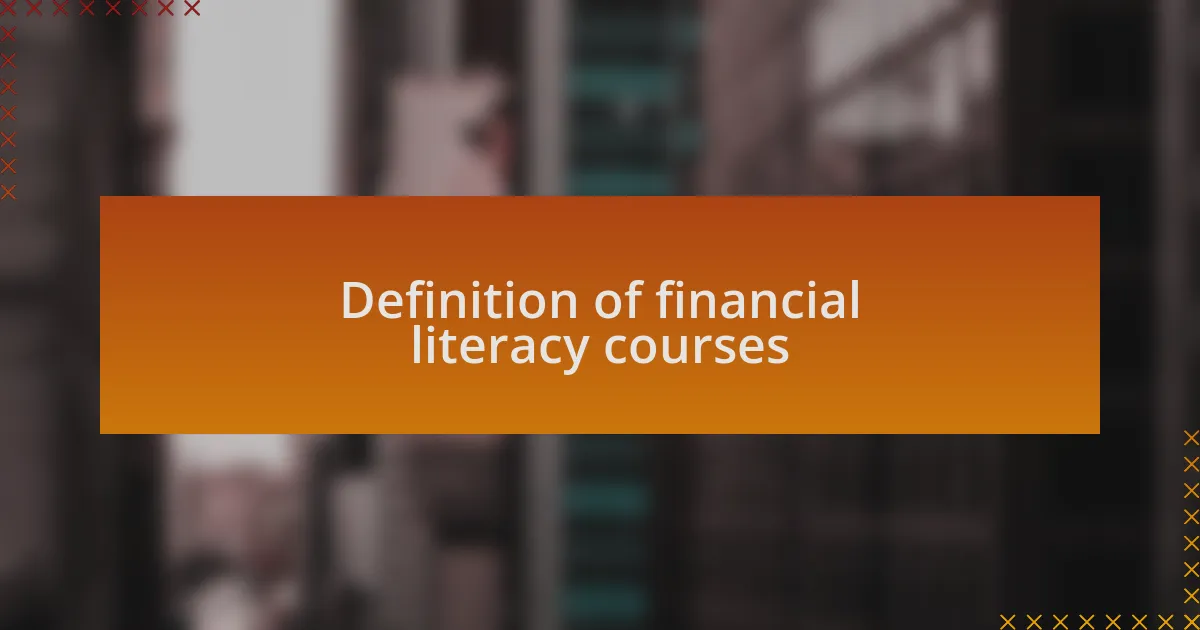
Definition of financial literacy courses
Financial literacy courses are structured educational programs designed to equip individuals with the essential skills and knowledge necessary to manage their finances effectively. These courses cover a wide range of topics, including budgeting, saving, investing, and understanding credit—all vital components of achieving financial stability. Have you ever felt overwhelmed by financial choices? That’s where these courses can be a game changer.
In my experience, financial literacy courses not only provide information but also empower individuals to make informed decisions. I remember attending one that focused on budgeting techniques. It was incredibly freeing to realize that personal finance doesn’t have to be complicated. The clarity I gained from understanding cash flow made me wonder why this knowledge isn’t taught in schools.
The practical tools and insights offered in these courses can transform one’s approach to money management. When I first learned about compound interest and how it affects savings and investments, it was like a light bulb went off for me. I often ask myself—how many people miss out on wealth-building opportunities simply because they lack this fundamental knowledge? Financial literacy courses are essential for bridging that gap.
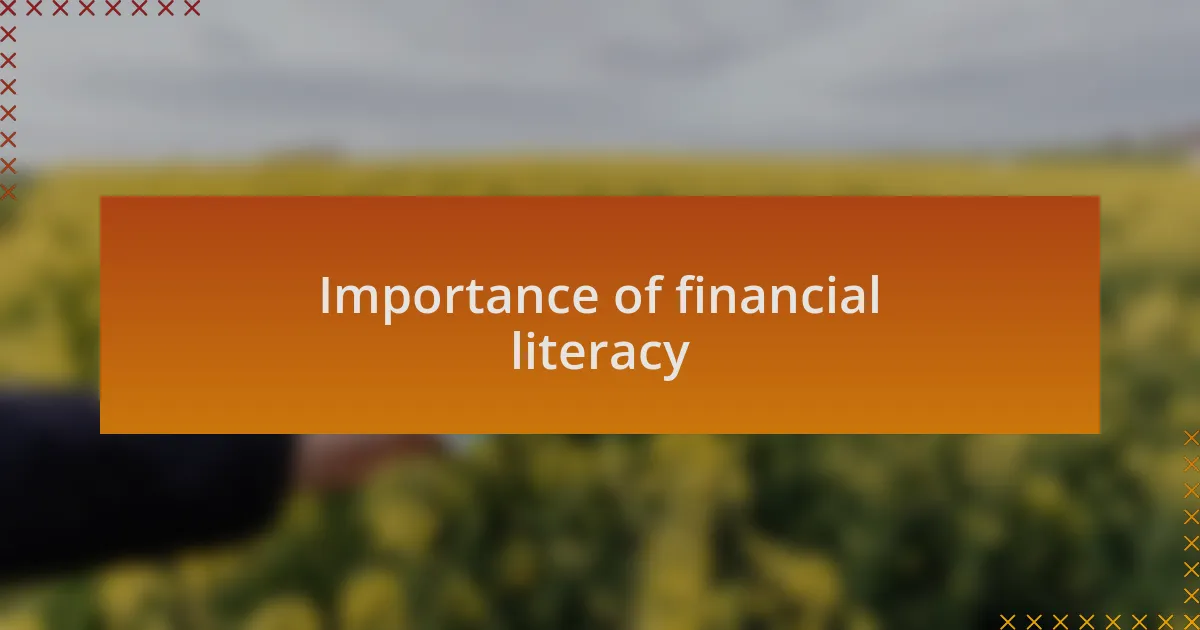
Importance of financial literacy
Understanding the importance of financial literacy can profoundly impact one’s life. I can still recall the financial anxiety I felt before I took my first course. It was overwhelming, facing daily decisions with little knowledge of how to budget or save effectively. This course opened my eyes to how organizing my finances could lead to a less stressful life.
Moreover, I’ve found that financial literacy empowers people to take control of their financial futures. For me, grasping concepts like interest rates and investment options was like unlocking a new perspective on opportunities. I often think, how many people stay stuck in a cycle of debt simply because they don’t understand these critical concepts? The unfortunate reality is that without this knowledge, many miss out on building wealth and achieving their dreams.
In my journey, the emotional connection to financial literacy cannot be overstated. When I finally comprehended the principles of financial planning, it was liberating. I often find myself reflecting on the confidence that knowledge brings; it’s not just about numbers, but the freedom to make choices that align with my goals. Why wouldn’t everyone strive for that clarity?
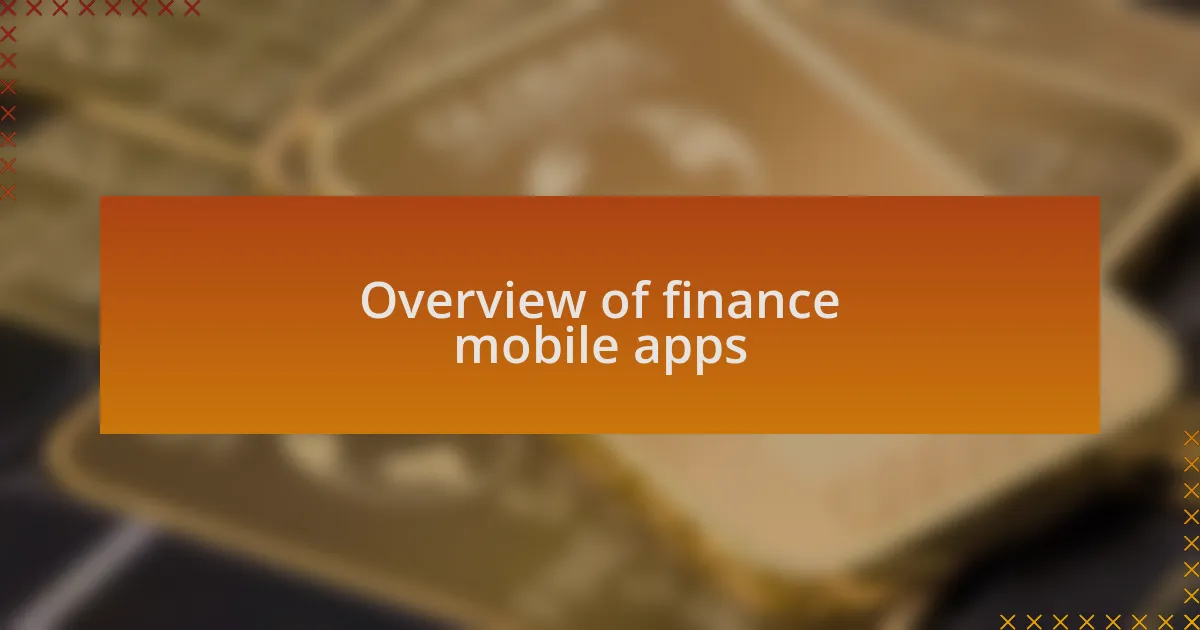
Overview of finance mobile apps
Finance mobile apps are revolutionizing the way we manage our money. I remember the first time I downloaded one; it was like having a personal finance advisor in my pocket. The immediacy of tracking expenses and getting real-time insights made a world of difference in how I viewed my spending habits.
These apps not only simplify budgeting but also often include features like bill reminders and investment tracking. Have you ever forgotten a payment and faced late fees? I know I have, and this is where mobile technology has turned the tide for me. Getting those timely alerts helps me stay one step ahead and prevents unnecessary stress.
Moreover, many finance apps incorporate gamification elements, turning the sometimes dull task of budgeting into a more engaging experience. I recall setting up a savings goal, and each time I added to it, I felt a sense of accomplishment, almost like leveling up in a game! Isn’t it fascinating how technology can transform our relationship with money? With the right app, financial management isn’t just necessary; it can be enjoyable.
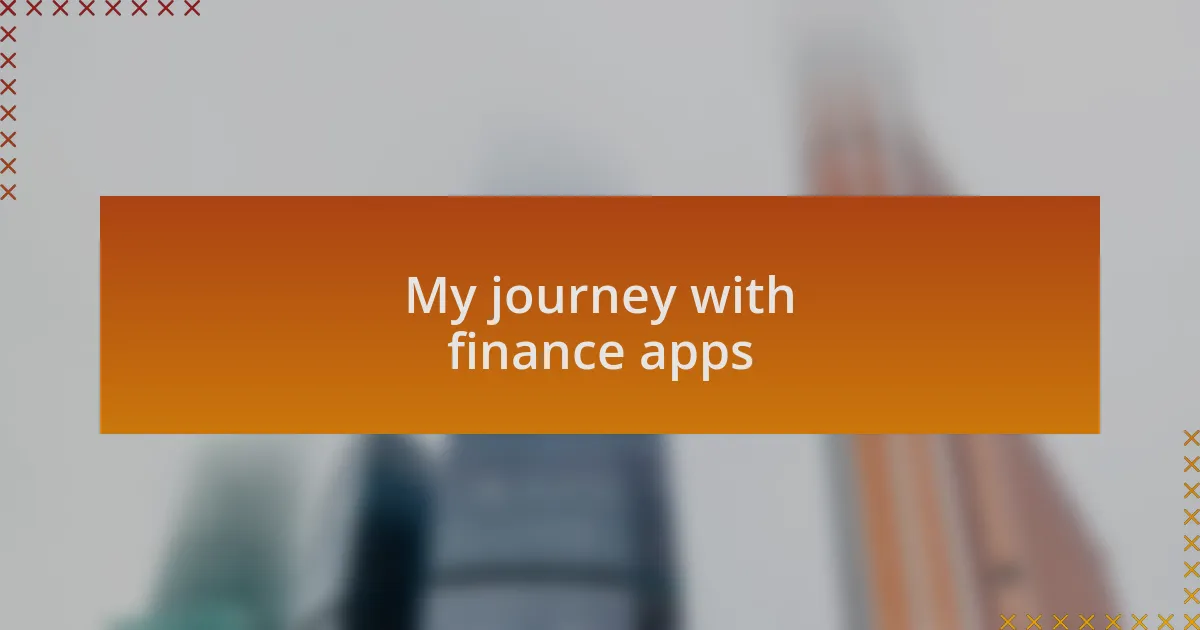
My journey with finance apps
Using finance apps has become a transformative part of my daily life. I still vividly remember the initial excitement of tracking my spending in a way that felt less like a chore and more like a discovery. The crisp graphs and easy-to-read metrics shifted my perspective on budgeting; it was as if the fog had lifted, allowing me to see exactly where my money was going.
One memorable instance was when I realized I was overspending on dining out. Looking at the categorized reports in my app, I decided to challenge myself: what if I cut that expense in half for a month? The result was not only a healthier bank account but also the fun of trying new recipes at home, something I never would have considered otherwise. Have you ever turned a financial insight into a lifestyle change? That experience taught me that finance apps are not just tools; they can inspire real, meaningful changes in our habits.
As I explored deeper into these apps, I discovered their budgeting features allowed me to set limits that actually felt achievable. I remember the moment I hit my savings goal for the first time—an unexpected thrill washed over me, akin to a major personal victory. This isn’t just about numbers; it’s about building a sense of empowerment and control over my finances that I hadn’t felt before. Don’t you think that feeling financially secure has a ripple effect on other areas of our lives?
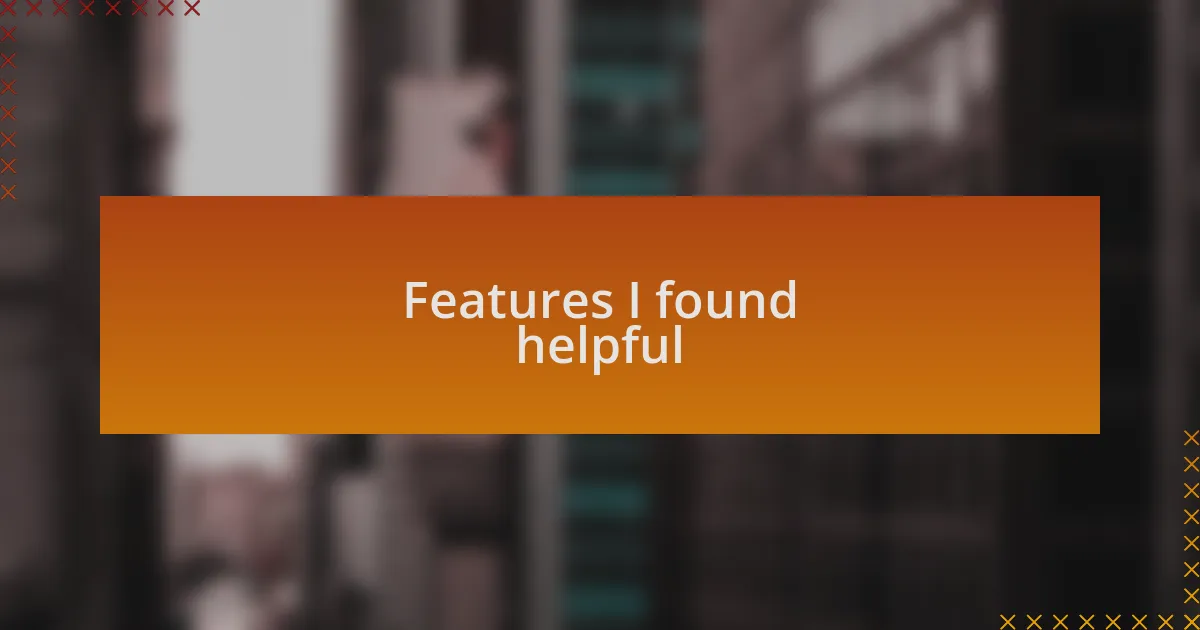
Features I found helpful
The visualization tools in my finance app have been incredibly enlightening. I can recall a time when I saw a pie chart displaying my monthly expenses; the realization hit me hard that a significant portion was going to subscription services I barely used. It was a bit unsettling, but it motivated me to reevaluate what I truly valued. How often do you overlook those recurring charges that slip under the radar?
Another feature that really stood out was the goal-setting option. I decided to save for a short vacation, setting a specific amount that felt both realistic and challenging. Seeing my progress bar fill up was nearly addictive—each little milestone I reached gave me a rush of motivation. Have you ever felt that small wins can fuel bigger ambitions? It made budgeting feel more like a game than a task.
Lastly, I found the educational resources invaluable. The articles and tips offered a way to deepen my understanding of personal finance concepts without feeling overwhelmed. I remember reading about emergency funds and how crucial they are for financial stability. That knowledge prompted me to prioritize saving for unforeseen circumstances, which has made me feel significantly more secure. Doesn’t it feel great to take control of your financial future with the right information?
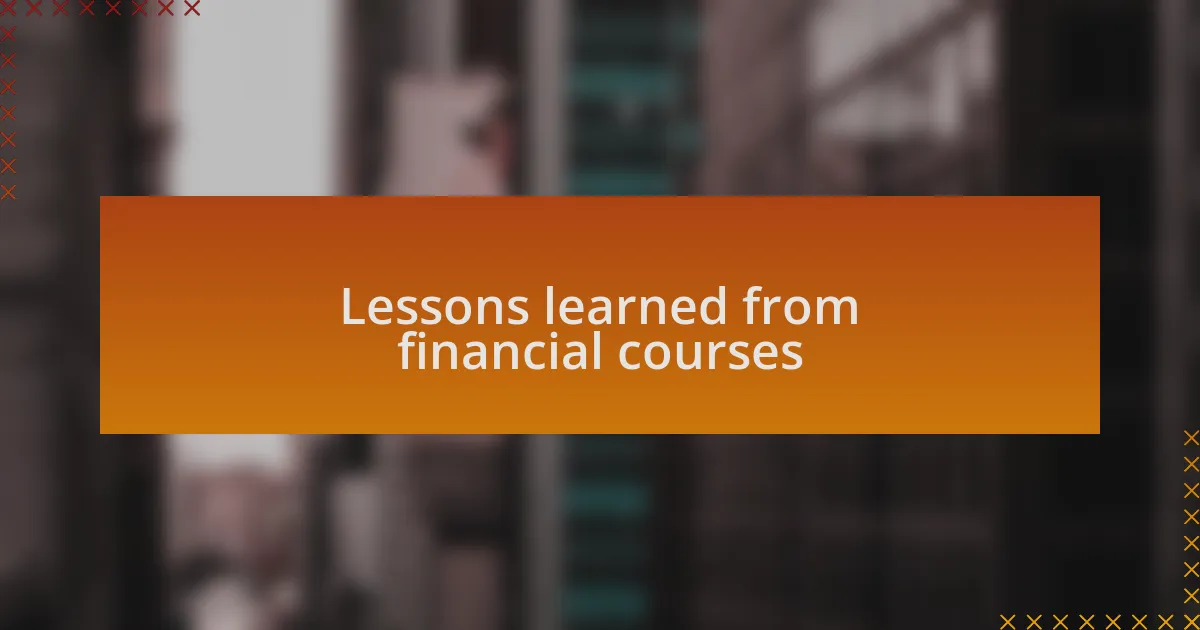
Lessons learned from financial courses
One of the most valuable lessons I learned from financial literacy courses was the importance of budgeting. Initially, I viewed budgeting as a restrictive chore. However, once I actually mapped out my monthly income versus expenses, I discovered room to allocate funds enjoying small luxuries without guilt. Have you ever experienced that moment when numbers on paper suddenly create clarity? It can be a game changer.
Another powerful takeaway was the concept of compound interest, which I never truly grasped until I delved into these courses. I recall sitting with my calculator, amazed at how even a small investment today could grow into a significant sum over time due to compounding. It’s like planting a seed and watching it flourish into a robust tree—would you invest in your future if you saw the potential like that?
Furthermore, understanding the difference between needs and wants profoundly reshaped my perspective on spending. A few months ago, in a moment of honesty, I realized that my daily coffee runs were more of a want than a need. So, I cut back. That simple adjustment not only redirected money toward my savings but also made me more mindful about each purchase. Isn’t it liberating to find empowerment in your spending choices?